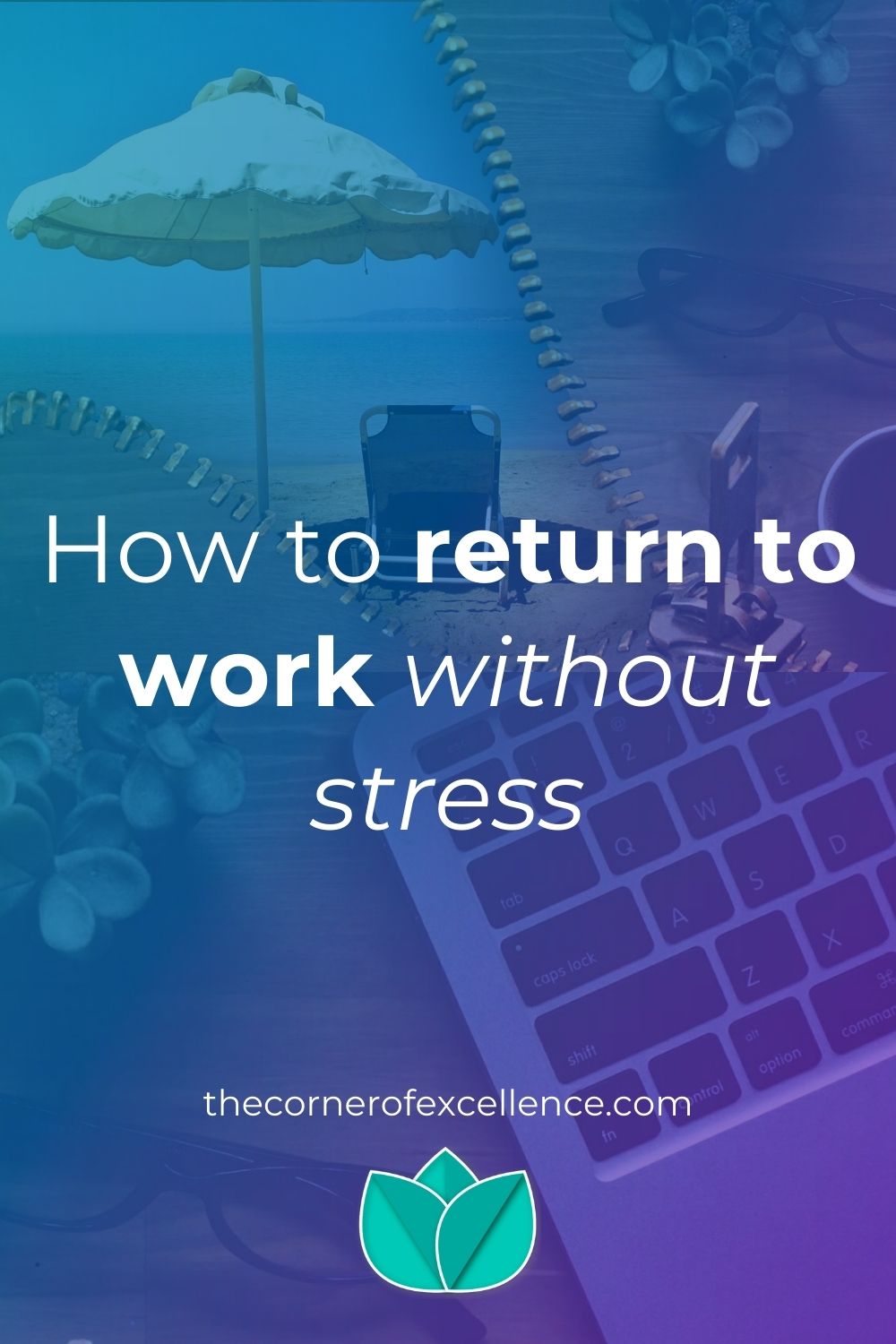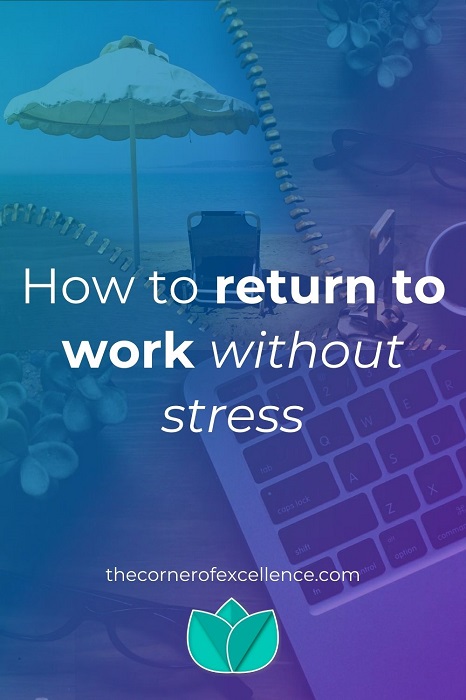
How does going back to work feel after your days off? When you think about it, do you already get stressed? Do you imagine the mailbox overflowing with emails or all the requests that await you? After a few days it seems that you do not even remember your days off?
There are a number of things you can do to get into the work rhythm without losing the effects of the rest or suffering from post-holiday blues. So let us look at a few tips for a return to work without stress.
Do not come back at the last minute
If you are going on a trip for several weeks, I suggest you organise it so that you have at least one day to acclimatise at home before returning to work. If you have travelled to a place to the west with a lot of time difference, I even recommend one more day. Jet lag is usually worse heading east.
Have some food reserve
I suggest you do not leave the pantry empty. Ensure that you have some non-perishable food stored. In this way, when you return, you will not have to go grocery shopping (or at least not need a large purchase) the first day.
Unpack your luggage
If you tend to be lazy when it comes to unpacking your suitcase and leave it there for days until you do the laundry, I suggest you rethink it. Even if just emptying the toiletry bag and throwing the clothes into the laundry basket, emptying the suitcase helps you to return to the routine.
Reserve the first day of work to acclimatise
As much as possible, on the first day back at work try to keep your schedule clear, especially of meetings with external people.
Depending on your job, an update with your boss, some of your main direct reports or the person who replaced you during your days off may be necessary. In some cases this can be solved by email.
In other cases, a meeting face-to-face, by videoconference or telephone will be better. If so, ideally you left your meetings scheduled before your leave. Although I suggest not putting them in the very first hours as soon as you arrive at the office.
The idea is that you can dedicate the first day to catching up and returning to the rhythm of work little by little without stress.
Greet your colleagues
When you get to the office, take time to say hello to your colleagues. Maybe arrange to meet those later, who you get along with well, for a coffee or lunch to tell each other about the holidays and catch up.
If you work from home, later when you turn to the email, for example you can send an email or a chat message to the people you would chat or have coffee with at the office.
Check your agenda and tasks
To get an overview, first open your calendar and your notebook or notepad. Take a look at your pending tasks and consider when to complete them. Check your calendar to see which meetings are awaiting you the first week back at work. What should you prepare for them? Write down the corresponding tasks.
If you did not schedule them before your leave, organise the aforementioned necessary catch-up meetings with your boss or subordinates. But try not to put the pressure on yourself that they (all) should be the first day, unless it is essential.
Check your email
First of all, do not be overwhelmed by the amount of unread emails. Start by just taking a first quick look. Do not read each and every email. For now, only check senders and subject lines to see if there are urgent issues to attend to. Answer those emails, manage them or write down the task to tackle in relation to them.
Later in the day, when you have done the important and urgent tasks, return to your mailbox. Eliminate all spam. Then attend the emails that you did not consider urgent at first, by answering, forwarding them or writing down the related tasks.
Decide if you really need and want to read all the newsletters that you normally read and that you have received during your absence. Perhaps it is okay to delete some directly or just take a glance at the headlines and then delete them. Move the ones you want to keep to a folder called for example “to read” or “newsletters”.
Do not put yourself under the pressure of attending to all the emails and cleaning up your mailbox on the first day, especially if the volume of accumulated emails is high.
Plan the week and month
Once you have reviewed the agenda, pending tasks and possible urgent and important emails, organise the next days. Which are your priorities and goals for the first week and for the month? What are the most important tasks for the next few days? Which meetings should you prepare? What should you dedicate your efforts to today and tomorrow, and what may wait?
All of this will help you not only to gain an overview but also to avoid feeling overwhelmed. So, once you have reviewed your agenda, pending tasks and urgent emails, create your to-do list and assign priorities.
Take one step after another
Do not expect to do all the pending tasks the first few days. The aforementioned planning will help you prioritise them. If necessary, inform bosses, colleagues or clients what you can realistically have tackled by when.
Take breaks
If you do not want to lose all the rest from your days off on the first day of work, remember to take breaks. Take a good lunch break. If possible, go for a good walk after eating. Also take short breaks throughout the workday.
Charge your batteries outside of work
Consider which are your energy sources. Which activities relax you and help you regain energy? Maybe it is meeting friends, practicing sports, or pursuing some hobbies. Of course, the desire for fun should not lead you to overload your free-time schedule.
By the way, taking a few moments from time to time to remember your days off and savour their memory is also a good trick to extend the pleasant and relaxing effects.
Plan your free time
Just as you have spent time planning your work, have fun making plans for your free time. Find a balance between obligations such as shopping, laundry, etc. and fun activities to recharge your batteries.
Take care of your body
A stress-free return to work requires taking care of our health. If you provide your body with the necessary nutrients, vitamins and minerals, it will be better able to cope with stress. So recover from the possible excesses of the summer and watch your diet.
Also go back to your sports routine. Or, if you do not have it yet, I highly recommend that you include physical activities in your day-to-day life. Sport makes us gain more energy than it tires us. It not only helps us to take care of and keep in shape our body but also to relieve stress.
Take care of your emotional well-being
If going back to work makes you sad or stressed, ask yourself why. What do your emotions want to tell you? What do you dislike or what do you not want to face? Then consider what you can change.
Also remind yourself of the positive aspects of your job. What do you like the most? Certain tasks or reconnecting with your coworkers for example?
Do you manage to return to work without stress?
How do you usually feel when you go back to work (or when thinking about returning to work)? Do you tend to feel overwhelmed and pretend to do everything on the first day? Do you forget to take care of yourself, rest and have fun, so that after a few days you hardly even remember your days off? Which of the tricks do you think will help you the most?

Sharing is caring!




